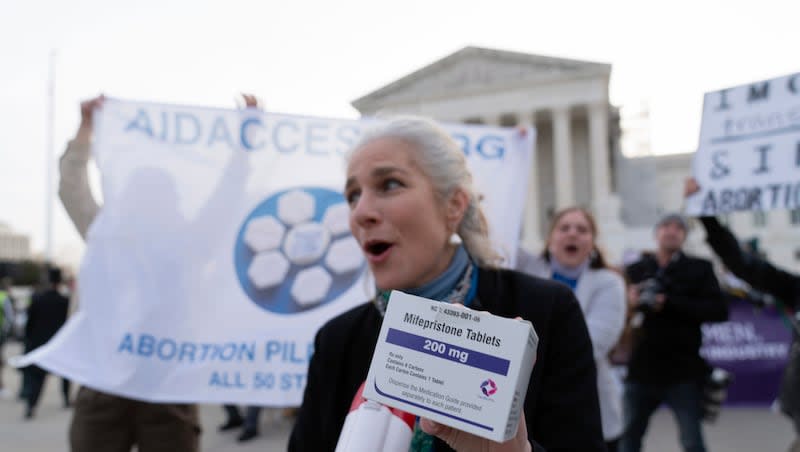Supreme Court appears likely to protect access to abortion pill

The Supreme Court on Tuesday heard arguments in its first abortion case since it overturned Roe v. Wade in June 2022, considering who should have access to a pill that’s used in more than half of abortions in the U.S. each year.
The justices are weighing whether the group of doctors that challenged the Food and Drug Administration’s guidelines for the pill has legal standing, whether the FDA adequately explained those guidelines when it put them in place and whether lower courts acted properly when ruling on the case.
During Tuesday’s arguments, the justices seemed sympathetic to the FDA’s arguments and likely to rule that the abortion pill can remain widely accessible.
The court’s decision is expected by the end of June.
What is mifepristone?
Tuesday’s arguments centered on a pill called mifepristone that’s used in combination with another pill called misoprostol to induce abortion.
The FDA approved the use of mifepristone in 2000 but limited the conditions under which it could be prescribed.
Patients had to be less than seven weeks pregnant and had to meet with a doctor in person to receive and take the pill. They then had to meet with the doctor two more times to make sure the pregnancy was terminated as expected, according to SCOTUSblog.
In 2016, the FDA eased these restrictions, making it possible to get a medication abortion up to 10 weeks into a pregnancy with only one doctor visit. Then, in 2021, the FDA made another change, allowing mifepristone and misoprostol to be provided by mail, SCOTUSblog reported.
The latest research from the Guttmacher Institute showed that 63% of abortions in 2023 were medication abortions, according to The Associated Press.
Supreme Court abortion pill case
Those FDA decisions about mifepristone led to the current case.
Doctors who brought the lawsuit argue that the FDA’s approach to medication abortion is unsafe and that mifepristone should not be widely available.
In addition to challenging the FDA’s decision-making process, the doctors have raised moral and religious concerns. They argue that at-home medication abortions lead to unexpected emergency room visits, which then force anti-abortion doctors to be involved in abortion treatment.
The FDA, as well as Danco Laboratories, which produces mifepristone, believes that the doctors do not have standing to challenge the FDA’s guidelines for mifepristone.
They also say that the lower courts mishandled the case by forcing changes to FDA guidelines without giving the FDA an opportunity to explain its actions, per SCOTUSblog.
Abortion pill oral arguments
During Tuesday’s oral arguments, attorneys for the FDA, Danco Laboratories and the doctors sparred with the justices about mifepristone access.
Much of the debate focused on the question of standing, and most of the justices appeared to agree that the doctors were not in the right position to demand a nationwide ban on mifepristone.
“Why can’t the court specify that this relief runs to precisely the parties before the court as opposed to looking to the agency in general and saying, ‘Agency you can’t do this anywhere’?” Chief Justice John Roberts asked at one point.
Justice Samuel Alito seemed to be most firmly on the doctors’ side. He took issue with the FDA’s and Danco’s arguments about standing, questioning what Americans are meant to do when they have concerns about a drug.
“Do you think the FDA is infallible?” he asked.
If the Supreme Court rules in favor of the FDA and Danco Laboratories, mifepristone will still not be available in states with abortion bans.
“Those bans don’t distinguish between abortion by pill and surgical abortion: They prohibit both,” The New York Times reported.

